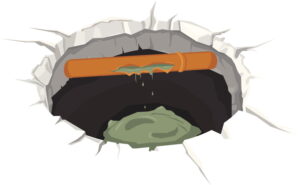If you’re like most homeowners, you probably don’t think about your sewer line that often. Who would want to? Unfortunately, problems with a broken or clogged sewer line will force you to think about it, often in an unpleasant way.
There’s two pieces of good news. First, we offer sewer line repair Atlanta as well as services to clean and replace them, so whenever you do run into a major sewer line problem, we’re here to help. Second, you can take steps to avoid major sewer line clogs and damages. Below is our advice for taking good care of your sewer line so it will keep doing its job unnoticed.
1. Careful landscaping
If you’re making any changes to your property, make sure that any plants with deep growing roots are kept away from where the sewer line runs. Tree roots are drawn to the nutrients inside a sewer line, and they can easily infiltrate the pipe and rupture it. This is one of the most common causes of sewer line repair, so be mindful of where you plant!
2. Know what goes down the toilet
Only human waste and toilet paper should get flushed down the toilets in your home. Please don’t use the toilet like a trash can that can discard anything—these objects can become jammed in the sewer line. You might think flushing kleenex and paper towels is fine, but both are water absorbent and can swell inside the pipes. The same applies to feminine hygiene products. Be especially cautious of wet wipes, which can rapidly clump together to become a lump of emulsion down in the sewer system. This includes so-called “flushable” wipes!
3. Don’t send FOG down the drain
FOG stands for fats, oil, and grease, a triple-threat to your sewer line as well as your drainpipes. Although FOG looks harmless when in hot liquid form, it hardens as it cools into a thick, waxy substance that is difficult to remove from sewer line walls.
4. Install drain screens
We recommend placing drain screens into bathroom sinks, showers, and tubs. You can purchase these at many retailers. These screens trap larger objects that can go down the drains and create sewer line problems, such as soap scum, hair, and objects like toys that might get accidentally knocked into the drain.
5. Use sewer-friendly products
Look for sewer-friendly and septic-safe products for cleaning and personal care. These products lack chemicals that are harmful to sewer pipes and can contribute to creating clogs.
6. Schedule regular plumbing maintenance
You don’t need to have a sewer line cleaning every year, but it’s a good idea to have annual inspections of your plumbing so professional plumbers can determine if your sewer line and drains need cleaning. We use powerful hydro-jetting tools to easily and thoroughly clean out sewer lines.
We recommend signing up for Wally’s Home Protection Plan, our plumbing maintenance plan that ensures your home’s plumbing gets regular check-ups. We’re focused on finding solutions!

